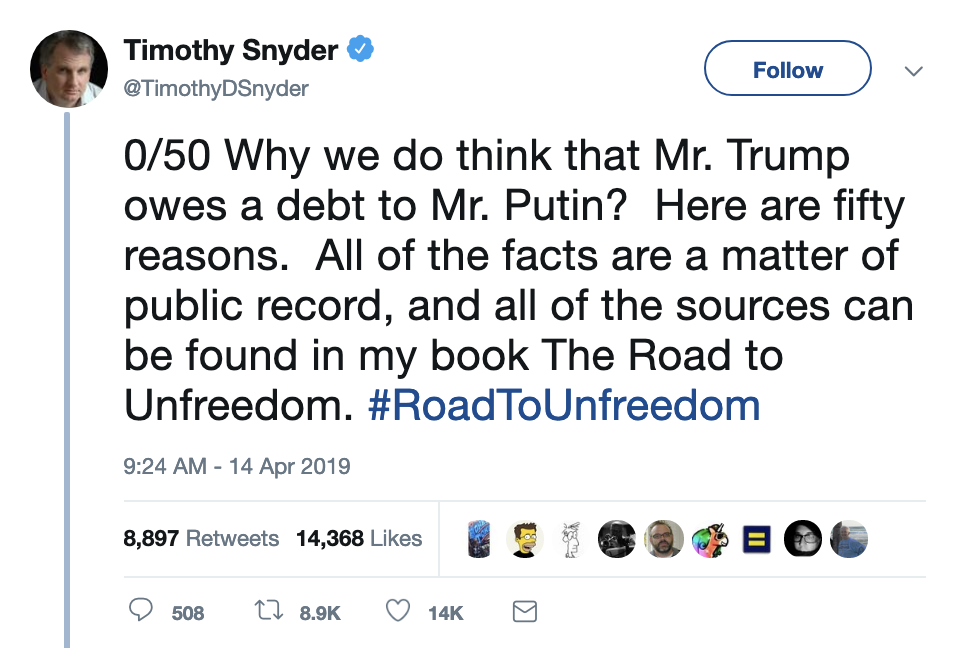People take for granted the world as it is, but Yale professor Timothy Snyder warns that the collapse of civilization is a real possibility with people like Donald Trump in power. His latest book The Road to Unfreedom shows how the rise of authoritarianism is strewn with the bodies of the unsuspecting. His message is riveting.
Synder tweeted about “fifty reasons” Trump has been corrupted:
‘0/50 Why we do think that Mr. Trump owes a debt to Mr. Putin? Here are fifty reasons. All of the facts are a matter of public record, and all of the sources can be found in my book The Road to Unfreedom.
#RoadToUnfreedom’
Called a “dark prophet” by The Chronicle Review, Synder warns:
‘Beware the one-party state.’
He wrote about the influence of Russia:
‘It’s literally impossible to understand Trump without Russia.’Russia obviously interfered in U.S. elections.’
William Barr sent Trump an abundantly paged brief into who he was and how he would consider the Mueller report. Attorney General Barr is in Trump’s pocket. Now, he is about to release a heavily redacted copy of the Special Counsel Robert Mueller report to Congress and the press, and within it lies Trump’s links to Russia.
In 1984, Trump began his longtime love affair with the Russian underworld. Rather than fear the Russian mob, the president rented them offices beneath his own in Trump Tower. Snyder tells of him laundering Russian money through his real estate throughout the 1980s.
Trump first traveled to Moscow in 1987. The Russians courted him as they spied upon him, seeking a wedge wherever they could.
After multiple bankruptcies and an inability to run his businesses in the black, the U.S. banking industry threw up its hands and turned off their welcome signs. That was when Trump turned to Russian investors, in the early 2000s.
Throughout the 2016 presidential campaign, Trump tried to get closer to Russian President Vladimir Putin, a man he clearly idolizes. At the same time that the real estate mogul worked to build his biggest deal ever, the tallest tower in Moscow, he tried to bribe Putin with a $50 million suite at its top.
Barr said that Mueller sought evidence of Trump committing crimes of collusion and obstruction, but failed. Synder on the other hand pointed out how the billionaire would not have made it over the top in 2016 without the aide of Russia’s encroachment into the 2016election internet.
Collusion basically meant that Trump’s win was illegitimate. What the Americans failed to understand was how Trump could destroy the entire U.S. democracy with the help of the Russians.
The New Yorker wrote about how another great democracy fell:
‘Hitler’s enablers in 1933—yes, we should go there, instantly and often, not to blacken our political opponents but as a reminder that evil happens insidiously, and most often with people on the same side telling each other, Well, he’s not so bad, not as bad as they are. We can control him.’
Will Trumpocracy replace our American democracy? Vox wrote
‘Trump has been extremely long on demagogic bluster but rather conventional—if extremely right-wing in some respects—on policy. But … this is entirely typical. Even Adolf Hitler was dismissed by many as a buffoon.’
Columnist Paul Krugman wrote in The New York Times:
‘Remember, Donald Trump claimed—falsely, of course—that millions of immigrants voted illegally in an election he won. Imagine what he’ll say if he loses, and what his supporters will do in response. If we take one path, it will offer at least a chance for political redemption, for recovering America’s democratic values. If we take the other, we’ll be on the road to autocracy, with no obvious way to get off.’
The Atlantic wrote about Trump’s destruction of U.S. norms:
‘Many, if not most, criticisms of Donald Trump revolve around norms and Trump’s propensity to break them or, more precisely, to act as if they never existed. Often the refrain is that Trump’s sins may not be illegal or unconstitutional, but that they violate the “normal” conduct of presidents and statesmen. They most certainly do, but this, by itself, isn’t necessarily anti-democratic.’
Finally, a note to take away from the Mueller investigation regardless of its bottom line:
‘The Russia investigation, even if it didn’t produce evidence of collusion, provided an important check on the Trump administration’s ability to do harm. Here, the fear of democracy dying motivates citizens to vote, to petition, and to organize.’














